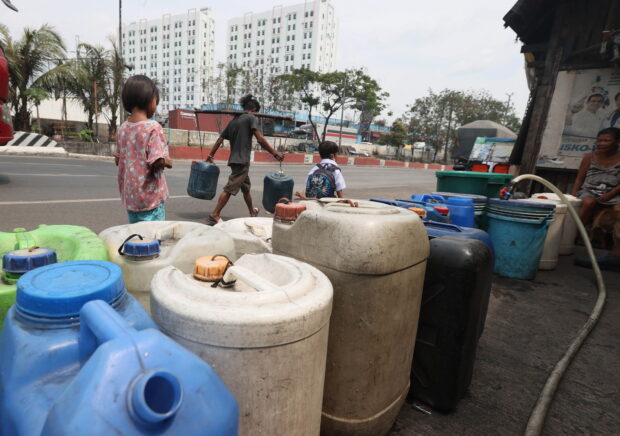
Residents of Bgy. 101 in Tondo, Manila line up their plastic containers to collect water as Maynilad Water Services Inc., announced daily water service interruptions across Metro Manila starting on March 28 and 29, 2023, to conserve water as the El Nino phenomenon looms. (File photo by MARIANNE BERMUDEZ / Philippine Daily Inquirer)
MANILA, Philippines — It’s bad enough to deal with a water shortage without having to worry about falling ill with dengue.
Amid the limited water supply induced by the dry season, health authorities reminded the public to properly cover their water containers to prevent a further rise in cases of dengue, a disease caused by mosquitoes that breed in water.
“The usual cause [of an increase in dengue cases] will be the water shortage because every time the water supply is lacking, people store water in containers, pails, and basins that are left uncovered,” Department of Health (DOH) officer in charge Maria Rosario Vergeire said on Sunday.
She explained that dengue-carrying mosquitoes like to breed in stagnant water, which is commonly found in household water containers.
“We should cover our water containers to avoid mosquitoes from multiplying in our households,” Vergeire said.
The health official also urged households to regularly clean their surroundings to avoid attracting mosquitoes.
“Mosquitoes like to stay in dirty, dark and small places so we all need to clean our surroundings so we can remove the garbage and useless stuff that attract mosquitoes,” she said.
‘Breeding places’
The DOH has recorded 27,670 dengue cases from Jan. 1 to March 18 this year. The figure is 94 percent higher than the 14,278 cases reported during the same period last year.
Dengue is caused by a virus that is spread through the bite of the day-biting Aedes aegypti and Aedes albopictus mosquitoes.
The DOH said the main strategy to prevent the spread of dengue is to destroy the breeding grounds of the virus-carrying mosquitoes.
“Search and destroy breeding places such as stagnant water and its containers; use self-protection; do not delay when sick; seek early consultation; where there is an outbreak, support fogging,” the department said.
The DOH also pointed out that while dengue currently has no treatment, the disease can be early managed.
On March 23, President Ferdinand Marcos Jr. acknowledged that the country was experiencing a water crisis, adding that the government has not been addressing the problem.
“We do not look at it, [we] just find other ways and put up with the idea that once in a while we’ll have to pull out our buckets and fill our bathtubs with water because there’s not going to be water for the next 24 hours,” he said.